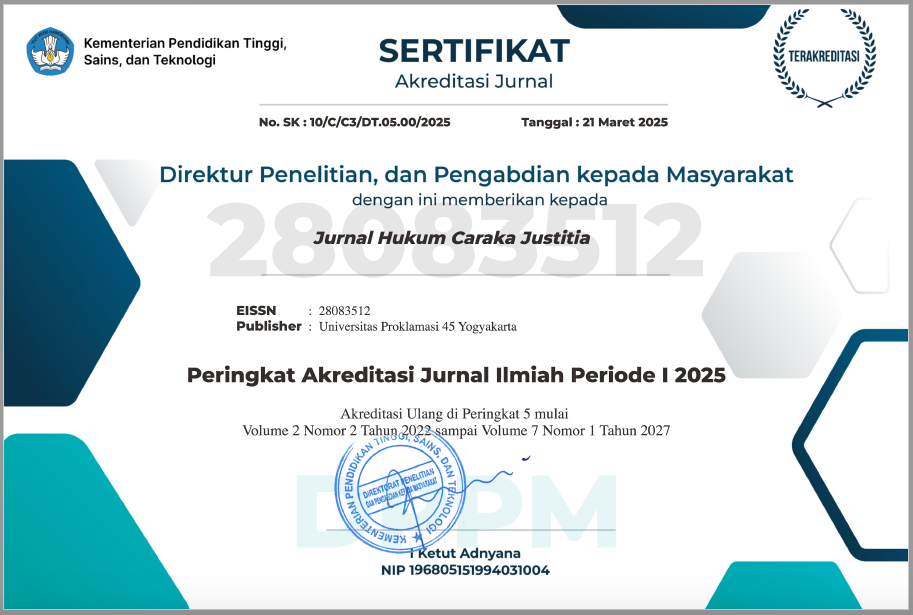Kegentingan yang Memaksa dalam Pembentukan Peraturan Pemerintah Pengganti Undang-Undang (Perppu) Nomor 1 Tahun 2022
Studi Mengenai Pemilihan Umum di Papua
DOI:
https://doi.org/10.30588/jhcj.v3i1.1515Keywords:
The Urgency Compelling, Determination, Perppu, Papua Elections.Abstract
The primary purpose of this research is to examine and find out the causes of the concept of urgency compelling in the formation of Peraturan Pemerintah Pengganti Undang-Undang (Perppu) Number 1 of 2022 to replace Law Number 7 of 2017 concerning general elections in Papua. The approach method used is normative juridical. This approach is intended to be a type of descriptive research concerning laws. Furthermore, the specification of this research is descriptive-analytical. Methods of data collection using library research that tests the document materials and library materials used in this study. The data were analyzed qualitatively normative, namely conducting research by interpreting and constructing statements contained in statutory regulations.
This research discusses the formation of government regulation in lieu of law for changes to law Number 7 of 2017 concerning general elections in Papua, considering that extraordinary policies and steps are needed to anticipate the impact of the formation of four new provinces namely South Papua, Central Papua, Papua Mountains, and Southwest Papua. It is intended that the 2024 Election will continue according to schedule and stages so as to create domestic political stability.
References
Artikel Jurnal
Mawuntu, J Ronald. “Eksistensi Peraturan Pemerintah Pengganti Undang-Undang dalam Sistem Norma Hukum Indonesia”. Jurnal Hukum Unsrat 19, no. 5 (Desember 2011): 118-127. http://repo.unsrat.ac.id/id/eprint/216.
Muda, Iskandar. “Pro-Kontra dan Prospektif Kewenangan Uji Konstitusionalitas Perpu”. Jurnal Konstitusi 10, no. 1 (Maret 2013): 69-88. https://jurnalkonstitusi.mkri.id/ index.php/jk/article/download/96/95.
Simamora, Janpatar. “Multitafsir Pengertian ‘Ihwal Kegentingan yang Memaksa’ dalam Penerbitan Perpu”. Mimbar Hukum 22, no. 1 (Februari 2010): 58-70. https://journal.ugm.ac.id/jmh/article/download/16208/10754.
Buku
Asshiddiqie, Jimly. Sengketa Kewenangan Konstitusional Lembaga Negara. Jakarta: Konstitusi Press, 2006.
Asshiddiqie, Jimly. Perihal Undang-Undang. Jakarta: Rajawali Pers, 2010.
MD, Moh. Mahfud. Politik Hukum di Indonesia, Jakarta: Rajawali Pers, 2010.
Prodjodikoro, Wirjono. Asas Hukum Tata Negara Indonesia, Jakarta: Dian Rakyat, 1970.
Peraturan Perundang-Undangan
Undang-Undang Dasar Republik Indonesia Tahun 1945.
Undang-Undang Nomor 12 Tahun 2011 tentang Pembentukan Peraturan Perundang-Undangan.
Peraturan Pemerintah Pengganti Undang-Undang Republik Indonesia Nomor 1 Tahun 2022 tentang Perubahan Atas Undang-Undang Nomor 7 Tahun 2017 tentang Pemilihan Umum.
Peraturan Presiden Nomor 87 Tahun 2014 tentang Peraturan Pelaksanaan Undang-Undang Pembentukan Peraturan Perundang-undangan.
Putusan Mahkamah Konstitusi Nomor 138/PUU-VII/2009 Tahun 2009.
Downloads
Published
How to Cite
Issue
Section
License
Copyright (c) 2023 Johny Harry Isabela Patty

This work is licensed under a Creative Commons Attribution 4.0 International License.
Authors who publish with JHCJ agree to the following terms:
Authors retain copyright and grant the JHCJ right of first publication with the work simultaneously licensed under a Creative Commons Attribution 4.0 International License that allows others to share (copy and redistribute the material in any medium or format) and adapt (remix, transform, and build upon the material) the work for any purpose, even commercially with an acknowledgment of the work's authorship and initial publication in JHCJ.
Authors are able to enter into separate, additional contractual arrangements for the non-exclusive distribution of the journal's published version of the work (e.g., post it to an institutional repository or publish it in a book), with an acknowledgment of its initial publication in JHCJ. Authors are permitted and encouraged to post their work online (e.g., in institutional repositories or on their website) prior to and during the submission process, as it can lead to productive exchanges, as well as earlier and greater citation of published work (See The Effect of Open Access).














